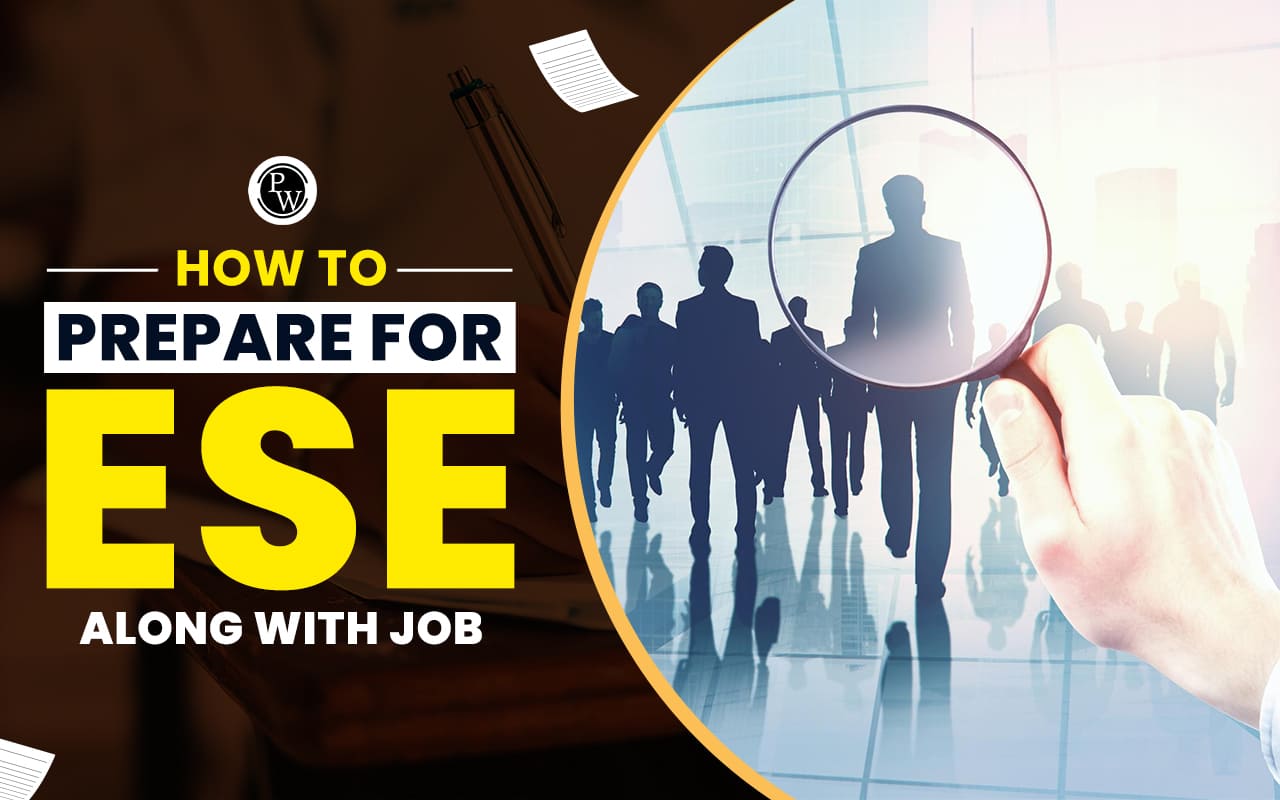
Can an Average Student Crack IES Exam?: IES Exam or UPSC ESE (Engineering Services Examination) is one of the toughest exams in India. Aspirants fail to clear it even after repeated attempts due to the false belief that only toppers can crack this exam. However, an average student can also clear the IES Exam with proper planning and regular study. Awareness about the exam pattern, syllabus, and important preparation tips and strategies will help average students to improve their scores.
Can an Average Student Crack IES Exam
UPSC ESE/IES exam is designed to assess the candidates’ technical expertise, problem-solving, and decision-making skills. The exam comprises three stages, namely, Prelims, Mains and Personality test (Interview). Students who do not have outstanding academic records in engineering are often apprehensive and think that they might not be able to give competition to their high-performing peers. This, however, is not the case as the game can be leveled by regular preparation, good strategy, and hard work. It is certainly not impossible for an average student to clear the IES Exam, but it would require extra focus on understanding the concepts, practice, and consistent efforts.
An average student is not expected to mug up the concepts but can still cover the weak areas with good study techniques and can make a little progress with each step. Candidates can also make significant progress in their preparation with the right guidance and targeted efforts, which will also help them to gain confidence and work with better efficiency in UPSC ESE preparation.
Check: UPSC ESE Syllabus 2026
UPSC ESE Preparation Strategies for Average Students
The UPSC ESE Exam is often considered a daunting task for average students. It requires not only intelligence but also hard work, discipline, and smart study strategies. However, the exam is designed to assess problem-solving skills, analytical thinking, and conceptual understanding rather than rote learning. Thus, even an average student can score well by adopting the right approach to UPSC ESE Preparation. Let’s understand how to prepare for UPSC ESE with effective strategies.
Understand the UPSC ESE Exam Pattern and Syllabus
Before starting the preparation for the UPSC ESE Exam, average students need to understand its exam pattern and syllabus. The UPSC ESE Exam consists of three stages: Prelims, Mains, and the Personality Test. While the Prelims exam assesses basic technical knowledge and general awareness, the Mains paper focuses more on in-depth technical questions.
-
Students can find which subjects and topics hold high weightage and need more attention, and which ones they can skim through.
-
For example, Mechanical engineering students should focus more on Thermodynamics and Mechanics as they carry more marks in the UPSC ESE Prelims.
Make a Study Plan and Stick to It
Students can achieve maximum success in the UPSC ESE Exam with proper planning. Divide the syllabus into small parts, and set weekly/monthly goals.
-
Make sure you keep a daily track of your progress, and no topic is left behind. Dedicate more time to weak subjects and revise the strong ones.
-
For example, if a student finds control systems difficult, they should devote 1–2 extra hours per day to it while revising the subjects that they find easy (like electrical machines) for 30–40 minutes.
Stick to Standard Books and Quality Materials
Students should use NCERT books, standard engineering textbooks, and quality materials for the UPSC ESE Preparation. Some students make the mistake of referring to many reference books at the same time, which can be a bad idea, especially for average students. Juggling multiple sources can waste time, and lead to unnecessary confusion.
-
Quality books and study materials cover all the concepts lucidly and systematically, which help in long-term retention.
Practice Previous Years’ Question Papers
Practice makes a man perfect, and UPSC ESE aspirants need to practice previous years’ UPSC ESE question papers.
-
Solving past year papers helps understand the types of questions asked, difficulty level, and time required to attempt each question.
-
Average students should make a habit of solving at least 1–2 previous year papers regularly to understand and analyze the UPSC ESE Exam pattern. This also helps to note the frequently asked topics and questions, allowing students to prepare for them in advance.
-
Practicing a particular subject regularly also improves speed and builds confidence.
Time Management
Time management is one of the key strategies for UPSC ESE aspirants, and average students are no exception. Students should learn to use their study hours wisely. Study in chunks, for example, 90 minutes of study followed by a 10–15-minute break.
-
Set daily, weekly, and monthly targets, and monitor your progress towards them. Practice time-bound question-solving to improve speed without compromising accuracy.
Revision is the Key
Revision is the key to retention for average students. While making notes of each subject, revise them at regular intervals. Flowcharts, diagrams, mind maps, and bullet points are great for revision, as these help in easy retention.
-
Revision also helps you remember important formulas, definitions, and theories that might come handy during the UPSC ESE Exam.
-
Schedule weekly and monthly revisions to ensure that no topic is forgotten even if you learned it slowly.
Attempt Mock Tests
Mock tests are an integral part of the UPSC ESE Exam preparation. Attempting regular mock tests will help you get the feel of the actual exam conditions and check your performance in terms of accuracy and time management.
-
Average students should practice mock tests to identify the areas where they are lagging and work upon them.
-
After every mock test, careful analysis of mistakes and improving upon them should be done. Practice as many mock tests as possible to build confidence and reduce exam anxiety.
Get Guidance and Mentorship
Guidance and mentorship are invaluable for an average student. Senior teachers, toppers of the UPSC ESE Exam, and coaching institutes can provide the much-needed clarity, tips, and shortcuts for complex topics.
-
Group study sessions with like-minded peers also help in exchanging knowledge and clearing doubts.
-
Guidance and one on one mentorship ensure that average students don’t waste time and energy in learning unnecessary topics and focus on important areas in the UPSC ESE syllabus.
Focus on Clear Concepts and Theories
The UPSC ESE Exam is a test of understanding and application of concepts, and not mere rote learning. Thus, average students should focus on conceptual clarity and understanding rather than memorization. Once a concept is clear, it will be easier for the students to solve different types of problems from it and frame application-based answers, which is important for UPSC ESE papers.
-
Make sure you can solve at least 2–3 types of problems from each concept before moving to the next topic.
What determines Your Success or Failure in IES Exam?
Several factors play a role in becoming a successful IES Exam aspirant apart from their academic performance. An average student can also identify and overcome their weak areas by knowing the right success factors:-
-
Clear Goal Setting: Successful candidates have a clear goal and strong motivation to become an IES officer, not just due to peer pressure.
-
Conceptual Understanding: Clear understanding of engineering fundamentals and concepts (not rote learning) helps high scorers stand apart from others.
-
Consistent Preparation: A regular study routine, disciplined habits, note-making, and sticking to a daily/weekly plan help.
-
Mock Tests and Self-Assessment: Regular mock tests, reviewing errors, and attempting previous year papers familiarize with exam pattern, and improve speed, confidence, and accuracy while identifying weak areas.
-
Time Management: Smart time allocation to subjects, balanced focus on technical & general studies, and proper time management during the exam improve success chances.
-
Proper Guidance: Guidance from experts, enrolling with a good coaching (if needed), and interacting with successful seniors help focused progression.
-
Motivation and Mental Endurance: Sustaining motivation throughout the preparation cycle, learning from failures, and handling stress are essential qualities.
Excel in your UPSC ESE 2026 preparation journey with UPSC ESE Online Coaching by PW. The Physics Wallah offers well-structured study material, mock tests, e-books, and more.
Can Average Student Crack IES Exam FAQs
Q1. Can an average student clear the UPSC ESE exam?
Q2. What are the key strategies for UPSC ESE preparation for average students?
Q3. How important is the right mindset for cracking IES Exam?
Q4. Can previous years question papers help average students?
Q5. How can average students score well in the interview stage?










